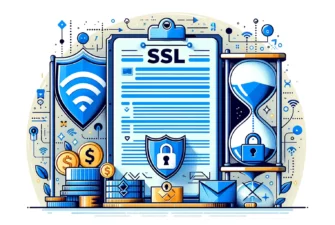
In recent years, the landscape of online security has undergone significant changes, generating questions about the relevance and status of Secure Sockets Layer (SSL) technology. With the rise of more powerful encryption protocols, such as Transport Layer Security (TLS), many have wondered: is SSL deprecated?
In this article, we delve into the topic to uncover the truth behind SSL’s status. You will learn when SSL was deprecated, why, and how it affected Internet security.
Table of Contents
- Is SSL Deprecated?
- When Was SSL Deprecated?
- Why Was SSL Deprecated?
- Why Are They Still Called SSL Certificates?
Is SSL Deprecated?
The short answer is yes. But to grasp the significance of SSL’s deprecation, let’s explore its role in securing Internet communications and how it has evolved over time.
SSL was originally developed by Netscape in the 1990s as a means to encrypt data transmitted between web browsers and servers.
It was the first protocol to ensure the confidentiality and integrity of sensitive information such as passwords and credit card details. However, as Internet usage grew and cyber threats evolved, vulnerabilities in SSL protocols became increasingly apparent, driving the need for more secure alternatives.
The transition from SSL to TLS represents a critical milestone in the evolution of Internet security. TLS, which stands for Transport Layer Security, builds upon the foundation laid by SSL but incorporates stronger encryption algorithms and enhanced security features.
By deprecating SSL in favor of TLS, the Web addressed the security loopholes of SSL protocols. This shift was facilitated by the widespread adoption of TLS 1.2 and 1.3 versions across web browsers, servers, and Internet standards organizations.
When Was SSL Deprecated?
SSL deprecation began in the mid-2000s when security researchers identified critical threats in SSL protocols that compromised encrypted communications. These vulnerabilities originated from fundamental weaknesses in SSL’s encryption mechanisms, which made it susceptible to various attacks, including the infamous POODLE (Padding Oracle On Downgraded Legacy Encryption) and BEAST (Browser Exploit Against SSL/TLS) attacks.
The deprecation of SSL carries significant implications for internet security and the broader digital ecosystem. By transitioning to TLS, websites benefit from improved encryption standards and enhanced protection against cyber threats. However, migrating away from SSL may be tricky for legacy systems and older infrastructure. The move requires careful planning and coordination for a smooth transition.
Why Was SSL Deprecated?
One of the primary flaws in SSL was its reliance on outdated cryptographic algorithms, and cipher suites no longer considered secure against modern cryptographic attacks. For example, SSL 3.0, the last version of SSL before the change to TLS, used the vulnerable RC4 stream cipher as its default encryption algorithm. RC4 was susceptible to statistical biases and plaintext recovery attacks, undermining the confidentiality of encrypted data.
Additionally, SSL protocols lacked protection against certain types of attacks, such as padding oracle attacks and protocol downgrade attacks. In a padding oracle attack, an attacker exploits vulnerabilities in the padding scheme used in block cipher modes to decrypt encrypted data.
Similarly, in a protocol downgrade attack, an attacker manipulates the communication between a client and server to force the use of weaker encryption protocols, such as SSL 3.0, which are easier to crack.
Furthermore, SSL’s lack of support for Perfect Forward Secrecy (PFS) posed a considerable security risk, as attackers could use compromised session keys to decrypt past communications retroactively. Perfect forward secrecy is a cryptographic property that ensures that session keys are temporary and cannot be derived from long-term secret keys, thus reducing the impact of key compromise on past communications.
These vulnerabilities exposed in SSL’s encryption raised concerns among industry experts about the security of Internet communications. In response, major web browsers and Internet standards organizations, including Mozilla, Google, and the Internet Engineering Task Force (IETF), began phasing out support for SSL protocols and enforced the use of TLS 1.2 across the Web.
Why Are They Still Called SSL Certificates?
Despite the transition to TLS, the term “SSL certificate” continues to be widely used to refer to digital certificates that secure websites. This terminology can be confusing for some, but there are several reasons why the term persists:
- Historical Usage: The term “SSL certificate” has been ingrained in the lexicon of internet security since the early days of SSL. As such, it has become a familiar term used to describe digital certificates issued by Certificate Authorities (CAs) to authenticate websites’ identities and enable encrypted communication.
- Interchangeable Terminology: “SSL” and “TLS” are often used interchangeably to refer to the same underlying technology. While TLS represents the newer, more secure version, the distinction between SSL and TLS is not always clear to the average internet user.
- Backward Compatibility: Some legacy browsers and servers still support the now-deprecated SSL protocols for backward compatibility reasons, particularly those that have not yet migrated to TLS-compatible solutions. Even if this is a bad security practice, the term “SSL certificate” remains relevant in describing the digital certificates used to secure these legacy systems.
- Simplicity and Familiarity: From a practical standpoint, the term “SSL certificate” is simple and familiar to users, making it easier to understand and communicate the concept of website security. While technically inaccurate in the context of TLS, the term continues to serve as a shorthand for digital certificates.
Bottom Line
The SSL directive is deprecated in favor of the more secure TLS protocol. While browsers and servers that support SSL technology still persist in some corners of the Internet, encountering such legacy systems is highly unlikely unless you manage one yourself.
By understanding why SSL is deprecated, you can prioritize the adoption of TLS and strengthen the security of online communications. For the best SSL management practices, host your websites only on servers with TLS 1.2 and 1.3 support.
Save 10% on SSL Certificates when ordering today!
Fast issuance, strong encryption, 99.99% browser trust, dedicated support, and 25-day money-back guarantee. Coupon code: SAVE10



























